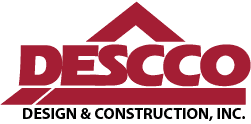Building or renovating a veterinary facility is not like any other construction project. Whether it’s a small animal clinic, a large veterinary hospital, or a specialized surgical center, the construction of veterinary facilities requires specialized knowledge, expertise, and attention to detail, none of which can be offered by your average general contractor. Veterinary construction must meet a variety of highly specific needs, and specialized contractors like DESCCO Design and Construction in the Eastern Pennsylvania region play a crucial role in ensuring that the final project meets the functional and regulatory demands unique to animal care!
Surgical Environments
One of the most critical aspects of veterinary construction, particularly in facilities offering surgeries, is the creation of sterile environments. HVAC (Heating, Ventilation, and Air Conditioning) systems play a significant role here. In a veterinary surgery room, it’s not just about temperature control but ensuring air quality and hygiene standards are met for the safety of animals and vets alike.
Surgical suites need specialized HVAC systems designed to maintain a clean and sterile environment, with filters removing contaminants and pathogens. In addition, these systems often include features like positive air pressure to ensure that outside contaminants do not enter the sterile surgical space. The temperature and humidity control in these spaces is also vital for both patient comfort and the efficacy of the procedures. Specialized contractors with experience in veterinary construction understand how to install and maintain these systems to ensure that the highest standards of sterility are met in every operating room.
Soundproofing
Another major consideration in veterinary construction is reducing stress for the animals. Anyone who has taken their pet to the vet knows how stressful the experience can be for both the animal and its owner. Loud noises, unfamiliar environments, and the smell of other animals can heighten anxiety, which can negatively impact a pet’s experience and make it more difficult for the vet to treat them.
Soundproofing is an essential component of veterinary construction, particularly in exam rooms. Specialized veterinary contractors know the right materials and construction techniques to minimize noise from the surrounding areas, like soundproof drywall, acoustic panels, and resilient channels.
In addition to soundproofing exam rooms, it’s also crucial to think about noise reduction in other areas of the clinic, such as waiting rooms, treatment areas, and hallways. By reducing external sounds, contractors can create a more peaceful environment, improving the overall patient experience and promoting a quicker recovery time for animals.
Specialized Spaces
Veterinary construction also requires careful planning of space layout. Unlike typical healthcare settings, veterinary facilities need specific areas dedicated to different types of animals and treatments. For example, separate spaces might be required for surgery, diagnostic imaging (like X-rays and ultrasounds), quarantine for contagious animals, and grooming areas, as well as spaces for animals to stay overnight when recovering from procedures or under observation.
Specialized contractors are able to work closely with veterinarians and staff to ensure that these areas are clearly defined and properly placed, and that they adhere to regulatory and safety requirements. Certain sections of the facility may require specific equipment or infrastructure such as dedicated ventilation or plumbing. Veterinary construction experts have the experience to understand these needs, creating a space that can run smoothly and efficiently.
Durability and Hygiene Standards
Veterinary spaces are subject to rigorous cleanliness standards, just like any medical facility. A veterinary clinic or hospital must withstand the daily wear and tear of pet traffic, cleaning, and medical treatments, while also maintaining the highest level of hygiene. Flooring, walls, and countertops need to be made of materials that are durable, easy to clean, and resistant to scratches or stains. For example, flooring materials like seamless vinyl or epoxy are excellent choices because they are non-porous, easy to disinfect, and durable enough to handle heavy traffic.
Specialized contractors with experience in veterinary construction are familiar with the specific materials needed to ensure a facility can maintain hygiene standards. This can even include small details like ensuring that surfaces are free from cracks or crevices where bacteria or fluids can collect, which is crucial for infection control. Choosing a contractor that is able to provide this knowledge is crucial to ensuring a satisfactory outcome to a veterinary construction or renovation project.
Compliance with Codes and Regulations
Every veterinary facility is subject to local building codes, zoning regulations, and industry standards. These regulations vary by region but often include specific requirements for animal safety, cleanliness, ventilation, and waste disposal. A veterinary construction expert understands these nuances and ensures that the facility complies with all the relevant regulations.
Veterinary construction presents unique challenges that require the expertise of specialized contractors familiar with the demands of veterinary care. From designing sterile surgical spaces with specialized HVAC systems to creating soundproof exam rooms that reduce animal stress, veterinary construction demands careful planning and extensive knowledge. The right contractor understands the importance of both functionality and compliance, ensuring that a facility can operate smoothly and safely while meeting the high standards required for veterinary care. Whether building a new facility or renovating an existing one, working with a contractor like DESCCO ensures that every aspect of your project meets the unique needs of your patients and staff alike! You can contact us today to learn more.
